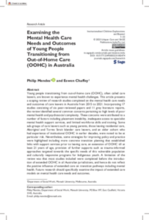Abstract:
Young people transitioning from out-of-home care (OOHC), often called care leavers, are known to experience mental health challenges. This article presents a scoping review of research studies completed on the mental health care needs and outcomes of care leavers in Australia from 2015 to 2021. Incorporating 17 studies consisting of six peer-reviewed papers and 11 grey literature reports, the review identified several common concerns pertaining to high levels of poor mental health and psychosocial complexity.
These concerns were attributed to a number of factors including placement instability, inadequate access to specialist mental health support services, and limited workforce skills and training. Some sub-groups of care leavers such as young parents, those leaving residential care, Aboriginal and Torres Strait Islander care leavers, and an older cohort who had experience of institutional OOHC in earlier decades, were noted to be at particular risk.
Nevertheless, some strategies for improving policy and practice were highlighted including more concrete transition planning that established links with support services prior to leaving care, an extension of OOHC till at least 21 years of age, provision of further supports such as trauma-informed approaches targeted towards the specific needs of this vulnerable population and culturally responsive programs for Indigenous youth.
A limitation of the review was that most studies included were completed before the introduction of extended OOHC in all Australian jurisdictions, and hence do not reflect the positive influence of extended care on transition pathways including mental health. Future research should specifically examine the impact of extended care models on mental health care needs and outcomes.

